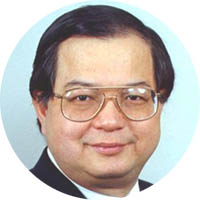IEEE Services 2018 Tutorials
Tutorial #1
| Blockchain in Services Applications | |
| Time: | July 2, 2018, 8:30 a.m. to noon |
| Summary: | The purpose of this tutorial is to provide the attendees the basic concepts of blockchain and some of its applications in the service industry. This tutorial will start with the concept of “trust” as the most fundamental motivation of the blockchain. We will show how to derive the major concepts of blockchain from “trust”. Afterwards, we will explain what will be needed to build a conceptual blockchain system and give examples of service applications. Finally, high-level views and pros and cons of the blockchain will be discussed. The tutorial will be primarily presentation mixed with active interactions with the attendees. |
| Background Required: | This tutorial is intended for those with little knowledge of blockchain. |
| Speaker: |  Peter Chen, Carnegie Mellon University Peter Chen, Carnegie Mellon UniversityPeter P. Chen is a well-known pioneer in database and software engineering. He is Distinguished Career Scientist at Carnegie Mellon University (CMU) and Professor Emeritus, Louisiana State University (LSU). After a Ph.D. from Harvard University, he was a faculty member at MIT, UCLA, Harvard, LSU, and CMU. He was Honorary Distinguished Chair Professor of Service Sciences at National Tsing Hua University, Taiwan. He is an IEEE, ACM, and AAAS Fellow. He received many awards, including ACM/AAAI Allen Newell Award and IEEE Harry Goode Award. Currently, he is doing research on analytics maturity model, autonomous systems, cyber security, and blockchain systems. |
Tutorial #2
| Programming Microservices in Service Agent Oriented Language Environment | |
| Time: | July 2, 2018, 8:30a.m. to noon |
| Summary: | This tutorial is on programming and managing microservices in a service agent oriented programming language and its integrated DevOps environment. It will blend a presentation and discussion with demonstrations and hands-on exercises. The presentation will be on the basic concepts of microservices, DevOps methodology, and the conceptual model of service agent oriented programming language. The basics of the CAOPLE programming language will be introduced with a number of examples, and the management of their deployment to a cluster of computer and dynamic executions in a cluster using a DevOps environment called CIDE will be demonstrated. Bring a notebook computer with Windows OS, if want to have hands-on experiences. |
| Background Required: | Some software development experience is needed. |
| Speaker: |  Hong Zhu, Oxford Brookes University Hong Zhu, Oxford Brookes UniversityHong Zhu is a professor of computer science at Oxford Brookes University, UK, where he chairs the Applied Formal Methods Research Group. He obtained his PhD degree in Computer Science from Nanjing University, China, and worked there until joining Oxford Brookes University. He is on the editorial boards of Journal of Software Testing, Verification and Reliability, Software Quality Journal, International Journal of Big Data Intelligence, and International Journal of Multi-Agent and Grid Systems. His research interests are in software development methodologies, especially methodologies for developing web-based applications. He has published two books and 190 papers in journals and conferences. |
Tutorial #3
| Big Data Services, Security and Privacy | |
| Time: | July 2, 2018, 1:30p.m. to 5:00p.m. |
| Summary: | This tutorial is to address the security and privacy issues for big data services and potential solutions to the problems. We will first provide an overview of the security and privacy considerations for big data services, and then describe the application of data science including stream data analytics and novel class detection for cyber security applications, such as insider threat detection. We will discuss the trends in areas such as adversarial machine learning that take into consideration the attacker’s behavior in developing machine learning techniques. Then, we will discuss some emerging trends in carrying out trustworthy analytics so that the analytics techniques can be secured against malicious attacks. We will focus on the privacy threats due to the collection of massive amounts of data and potential solutions. Finally, we will discuss the integration of services computing, such as cloud-based services, with secure data science including applications in assured information sharing and social media. |
| Background Required: | Some knowledge of web services, cyber security and privacy. |
| Speaker: |  Bhavani Thuraisingham, The University of Texas at Dallas Bhavani Thuraisingham, The University of Texas at DallasBhavani Thuraisingham is the Louis A. Becher, Jr. Distinguished Professor of Computer Science at The University of Texas at Dallas (UTD) and the Executive Director of UTD’s Cyber Security Research and Education Institute since October 2004. She has 35 years experience working at Honeywell, MITRE, NSF and UTD. She is the recipient of numerous awards, including the IEEE CS 1997 Technical Achievement Award, ACM SIGSAC 2010 Outstanding Contributions Award, and the IEEE CS Services Computing 2017 Research Innovation Award. She is a Fellow of the IEEE and the AAAS. She has published numerous papers and books and is the inventor of six US patents. She received her PhD at the University of Wales, Swansea, UK. |
Tutorial #4
| Cognitive IT Service Management in Real-World: Challenges, Technologies and Practices | |
| Time: | July 2, 2018, 1:30p.m. to 5:00p.m. |
| Summary: | The attendees of this tutorial can expect to understand the importance, key technical challenges, technologies, and practices of cognitive IT Service Management (ITSM) in real-world. With the widely applications of AI technologies, IT services industry is now shifting from people-led and technology-assisted model to a technology-led and people-assisted model. This tutorial reviews the evolution of ITSM and discusses opportunities and challenges of cognitive ITSM in real-world. We present AI-driven ITSM platform and analytics technologies to address these technical challenges. Finally, we share real-world cognitive ITSM practices for large-scale enterprise-level ITSM with demonstration and case sharing. |
| Background Required: | No specific prerequisite knowledge or skills are required. |
| Speaker: |  Fanjing Meng, IBM Research Fanjing Meng, IBM ResearchFanjing Meng is a Senior Technical Staff Member at IBM Research. Her current research focuses on applying advanced analytics into large-scale IT operations data, such as metrics, logs, events, and tickets, to detect anomalies and accelerate problem diagnosis. She received numerous awards, including the best paper award from IEEE CLOUD 2013. She has published more than 20 papers and had more than 20 patents and patent applications. She serves as a technical program committee co-chair/member for top international conferences and a reviewer of international journals. She joined IBM Research after receiving her Ph.D. degree from Beihang University in 2004. |